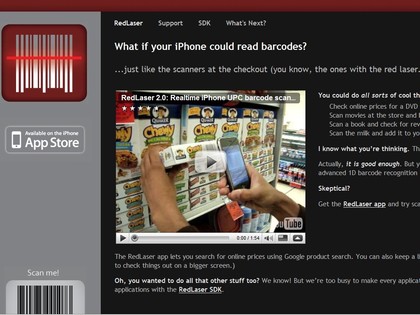What will the high street look like in 2020?
How the internet is driving change in bricks-and-mortar stores
Shopping from the comfort of your couch on your netbook – or via the internet on your telly – and from your desk at work is now very much the norm, with the next major shift in online retail expected to be focused squarely on shopping via your mobile phone.
TechRadar noted recently how the car price guide Parker's new iPhone app and Nokia's new Point and Find software (which scans barcodes and automatically finds the item on a price checking website) are both indicative of key new trends in mobile shopping, with fundamentally serious implications for the old-fashioned offline high street.
Bottom line, if the consumer (ie you!) can instantly know the best deal available anywhere on anything (be it a car, a house, a pint of Fosters or a recently re-mastered Foster and Allen collection on DVD) then retailers have to fight ever-harder to maintain the slightest profit margins.
"The combination of cameraphones, apps and Augmented Reality is enormously exciting," noted TechRadar columnist, Gary Marshall, "unless you're a car dealer, or a shop owner, or a restaurateur, or a hotelier, or… well, pretty much any retail business."
Kelkoo MD Bruce Fair agrees with Marshall, telling us: "I think mobile will continue to develop online retail apps. I know that many of the big mobile manufacturers are looking to deliver widgets and mobile platforms to users already pre-downloaded onto handsets which enables the user to shop more effectively online on their mobile device."

SCAN TO SAVE: Barcode scanning apps such as Red Laser are set to become ubiquitous in 2010
With affordable and widespread availability of advanced 3G smartphones a key tech trend in 2010, we also are starting to see rapid developments in apps such as the iPhone bar-code scanner 'RedLaser' that lets you go into stores and scan products as you browse and immediately compare prices on that item with other stores.
Sign up for breaking news, reviews, opinion, top tech deals, and more.
"The commercials haven't quite caught up with that type of tech yet," says Kelkoo MD Bruce Fair, "but they will do in the next six months. It is inevitable. So at the moment you can use one of these types of apps to scan a barcode, but the results it will give you aren't necessarily very good. They might give you US stores such as Barnes and Noble and so on, but next year all of this will change. It is a great opportunity and everybody is going to pounce on it."
Where do you buy your games?
In terms of where new forms of online and mobile retail models – combined with digital distribution of products – are really threatening traditional business structures, it is usually advisable to look towards the cutting edge videogames and entertainment software industries to get an idea of where future trends are heading (and where others will follow).
While it is clear that the likes of Disney and Apple will continue to plough back their considerable profits into making their high street retail zones into what Steve Jobs recently called 'imagination parks', on a more realistic and near-future level, high street music and games specialist HMV is already rapidly expanding into some interesting new areas of entertainment itself.
"At HMV we've been looking to move away from being a one-dimensional retailer of recorded music, film and games software to becoming an entertainment hub for popular culture in a much wider sense," HMV's Head of Games, Tim Ellis told TechRadar.
"This means giving consumers access to the content they love the way they wish to enjoy it - whether through physical product, downloads, online gaming or even the live experience."
"During the past twelve months HMV acquired a stake in a number of live music venues, including the HMV Forum and the HMV Hammersmith Apollo, while we have also been trialling a new cinema format in association with Curzon Artificial Eye and we have rolled out more than 40 gamerbase online gaming centres across the HMV store estate," Ellis adds.
"There will always be a place for high street stores, as there will for online shopping, but retailers are having to evolve and adapt to remain relevant to the needs of their customers. If they do this successfully they will still be here in 10 years' time."
Basically, it is down to popular and mass entertainment businesses – be it games, music, movies or whatever else – to look towards creating new ways of engaging and communicating with their gamers, listeners and viewers. And HMV is clearly leading the way in terms of looking at ways of offering these consumers 'exclusive' events – at which they can get access to (and even a chance to meet) their favourite bands, artists, game developers, movie directors and the like.
"We believe online buying will play a bigger part in the shopping experience, with high street stores evolving into experience stores where consumers touch and feel the product," agrees Twenga CEO Bastien Duclaux.
"Consumers will then choose from a number of ways to buy and arrange delivery, including the use of mobile phones, with price comparison sites increasingly launching mobile phone applications."
Current page: The future, part 2: Mobile shopping apps
Prev Page What will our high streets look like in future? Next Page The future, part 3: 3D virtual avatars in-store